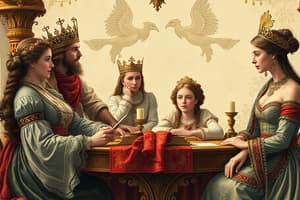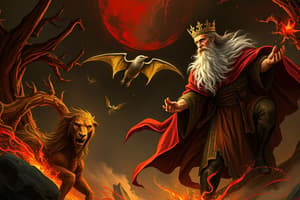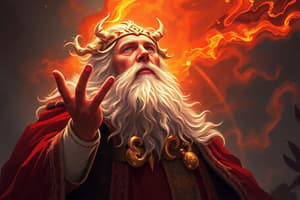Podcast
Questions and Answers
What was Lear's intention when planning to divide his kingdom?
What was Lear's intention when planning to divide his kingdom?
- To initiate a war with France
- To increase his wealth
- To avoid conflicts after his death (correct)
- To gain favor with the Duke of Burgundy
How does Cordelia respond to Lear's love contest?
How does Cordelia respond to Lear's love contest?
- She challenges her sisters to a duel
- She declares her love loudly
- She exaggerates her love for him
- She refuses to participate (correct)
What does Lear mean by saying, 'Nothing can come of nothing'?
What does Lear mean by saying, 'Nothing can come of nothing'?
- Wealth is more important than feelings
- Only grand gestures are worthwhile
- Love should be materialized with words
- Value cannot exist without demonstration (correct)
What motivates Goneril and Regan in their speeches to Lear?
What motivates Goneril and Regan in their speeches to Lear?
What does Lear plan to do with Cordelia after the speeches?
What does Lear plan to do with Cordelia after the speeches?
Who does Lear plan to give the most of his kingdom to?
Who does Lear plan to give the most of his kingdom to?
What does Cordelia believe about her sisters' speeches of love?
What does Cordelia believe about her sisters' speeches of love?
What does Lear's action of dividing the kingdom reflect about his character?
What does Lear's action of dividing the kingdom reflect about his character?
What intensifies Lear's mental anguish?
What intensifies Lear's mental anguish?
What is described as the tragic flaw in both Lear and Gloucester?
What is described as the tragic flaw in both Lear and Gloucester?
How do Lear and Gloucester's errors of understanding differ?
How do Lear and Gloucester's errors of understanding differ?
What do both Lear and Gloucester learn through their suffering?
What do both Lear and Gloucester learn through their suffering?
Which phrase best captures the parallel between Lear and Gloucester's situations?
Which phrase best captures the parallel between Lear and Gloucester's situations?
What does Gloucester express in his cry to heaven?
What does Gloucester express in his cry to heaven?
What is a result of Lear's and Gloucester's choices regarding their sons?
What is a result of Lear's and Gloucester's choices regarding their sons?
What does R.G. Moulton praise Shakespeare for in 'King Lear'?
What does R.G. Moulton praise Shakespeare for in 'King Lear'?
What is Edmund's main complaint in his soliloquy?
What is Edmund's main complaint in his soliloquy?
Which system does Edmund reference to highlight the unfairness faced by younger siblings?
Which system does Edmund reference to highlight the unfairness faced by younger siblings?
How does Edmund view the circumstances of his conception compared to Edgar's?
How does Edmund view the circumstances of his conception compared to Edgar's?
What does Edmund suggest about Gloucester's feelings towards him and Edgar?
What does Edmund suggest about Gloucester's feelings towards him and Edgar?
What is Lear's intention regarding his kingdom as mentioned in the content?
What is Lear's intention regarding his kingdom as mentioned in the content?
What does Edmund plan to do regarding Edgar's inheritance?
What does Edmund plan to do regarding Edgar's inheritance?
How does society's view on legitimacy impact family dynamics according to Edmund's viewpoint?
How does society's view on legitimacy impact family dynamics according to Edmund's viewpoint?
What is suggested about Lear's capacity to govern as he ages?
What is suggested about Lear's capacity to govern as he ages?
What achievement of Shakespeare is most praised by critics regarding 'King Lear'?
What achievement of Shakespeare is most praised by critics regarding 'King Lear'?
How does the blinding of Gloucester serve in relation to Lear's experiences?
How does the blinding of Gloucester serve in relation to Lear's experiences?
What differentiates Lear's and Gloucester's sins and their respective punishments?
What differentiates Lear's and Gloucester's sins and their respective punishments?
What is represented through the duality of man’s nature in 'King Lear'?
What is represented through the duality of man’s nature in 'King Lear'?
In what way does 'King Lear' illustrate the theme of filial ingratitude?
In what way does 'King Lear' illustrate the theme of filial ingratitude?
What does the renaissance proverb about sudden joy and excessive grief imply in the context of Lear and Gloucester?
What does the renaissance proverb about sudden joy and excessive grief imply in the context of Lear and Gloucester?
How are Albany and Cornwall characterized at the start of 'King Lear'?
How are Albany and Cornwall characterized at the start of 'King Lear'?
What structural element in 'King Lear' highlights the contrast present in Shakespeare’s plays?
What structural element in 'King Lear' highlights the contrast present in Shakespeare’s plays?
What is the primary question raised by the characters in King Lear regarding justice?
What is the primary question raised by the characters in King Lear regarding justice?
How does Lear express his feelings of being wronged in Act 3 Scene 2?
How does Lear express his feelings of being wronged in Act 3 Scene 2?
What tragic event follows Lear's loss of Cordelia?
What tragic event follows Lear's loss of Cordelia?
What does Gloucester realize about the natural world?
What does Gloucester realize about the natural world?
How is Edmund ultimately dealt with in the play?
How is Edmund ultimately dealt with in the play?
What punishment does Cornwall inflict on Gloucester?
What punishment does Cornwall inflict on Gloucester?
What role does Albany play in the fate of Lear and the other characters?
What role does Albany play in the fate of Lear and the other characters?
What theme is represented by the phrase 'As flies to wanton boys are we to the gods'?
What theme is represented by the phrase 'As flies to wanton boys are we to the gods'?
Flashcards are hidden until you start studying
Study Notes
Shakespeare's King Lear: Plot and Themes
- "King Lear" is praised for its intricate fusion of two distinct plots, showcasing Shakespeare's artistic construction skills.
- The main plot revolves around King Lear’s parental guilt and subsequent punishment due to his flawed decision-making.
- Lear and Gloucester represent dual aspects of humanity, with both experiencing deep suffering and eventual wisdom.
Main Characters and Their Actions
- King Lear's first act involves dividing his kingdom among his daughters based on their declarations of love, leading to unexpected consequences.
- Goneril and Regan use flattery to deceive Lear while Cordelia, the youngest, refuses to exaggerate her love, leading to her disinheritance.
- Lear’s misguided desires lead to his mental deterioration; Gloucester’s physical punishment mirrors his emotional blindness.
Duality of Suffering
- Both Lear and Gloucester suffer due to their "errors of understanding," yet their roles differ; Lear is active while Gloucester is passive.
- Gloucester's blinding signifies physical suffering, while Lear’s mental anguish stems from his rash decisions and loss of sanity.
- The play reflects the Renaissance proverb that sudden joy can be as deadly as excessive grief; both characters experience this in relation to their children.
Themes of Justice and Human Nature
- "King Lear" grapples with the notion of justice amidst chaos and human cruelty; characters question the existence of divine justice.
- Gloucester's observation highlights the indifference of the gods, while Edgar maintains faith in cosmic justice, underscoring the play's moral ambiguity.
- Key events showcase the theme of injustice, such as Gloucester’s punishment for aiding Lear and Lear's condemnation by his own daughters.
Key Plot Developments
- Edmund’s soliloquy reveals the societal stigma against illegitimacy and highlights the competitive nature between siblings; he seeks to usurp Edgar.
- Lear’s descent into madness is exacerbated by his abandonment by Goneril and Regan, who strip him of power and dignity in a storm.
- The violent struggles between legitimate and illegitimate heirs mirror the conflict between justice and personal retribution.
Conclusion of Tragedy
- The tragic ending underscores the futility of Lear's search for love and validation, culminating in his heartbreak over Cordelia’s death.
- The double plot serves to enhance the central themes, exposing the complexities of human relationships and the consequences of pride.
- Edgar’s triumph over Edmund and Lear’s ultimate demise highlight the chaos and cyclical nature of suffering and injustice in the world.
Studying That Suits You
Use AI to generate personalized quizzes and flashcards to suit your learning preferences.




